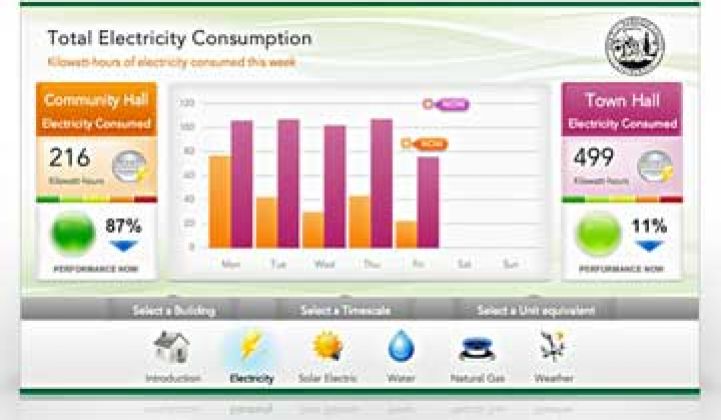The problem with energy efficiency is how to pay for it upfront. Even if the payback for lighting upgrades or HVAC improvements pay off in less than a year, many companies still can’t get the financing, or don’t want to spend the money.
But what if there’s no upfront cost? The concept of paying for improvements through utility bills or through demand response programs is slowly gaining traction.
The latest addition is Lucid and Constellation Energy, which recently announced a partnership that will allow companies to use money earned through demand response programs to pay for Lucid’s building dashboard. “We’re hoping building owners won’t be so standoffish about [demand response] as they’ve been in the past,” said Andrew deCoriolis, director of engagement at Lucid.
Commercial building owners have shied away from demand response because they don’t want to upset tenants, who don’t directly pay the utility bills. By giving information to tenants and owners through the dashboard, however, Lucid is trying to change who has access to building energy information and who takes an interest in conservation.
“We’re getting close to some real game-changing events,” said deCoriolis, referring to the convergence of building energy disclosure legislation, automated and tailored demand response and easy-to-use tools for every type of business.
Constellation Energy also knows there’s a whole lot more to demand response than large commercial and industrial companies cutting off load during the hottest days of summer.
Recently, the large, diversified energy provider announced a partnership with Marriott International to deliver 23 megawatts of controllable load across 264 hotel properties in the Northeast, Mid-Atlantic, Texas and California.
Now, Constellation has formed an alliance with Lucid, an energy dashboard company that is best known for its work in institutions using competition and social media to drive energy efficiency and automated demand response participation. “It’s about making conservation a more viral offering,” Chris Cantone, senior vice president sales of load response at Constellation Energy, said of the partnership with Lucid.
The interest in working more closely with Lucid came from firsthand experience. When Constellation first came across Lucid’s technology, the company wanted to install it at one of its headquarter buildings in Baltimore, MD. The building was trying to achieve LEED Gold status and Constellation suggested a Lucid kiosk in the lobby of the building that would engage tenants and visitors in how the building was using energy.
But the kiosk might just be the beginning. Constellation is looking to put another kiosk into its other headquarters in Baltimore, MD, and the company is discussing submetering so it can have floor-by-floor competitions in energy efficiency.
The experience of tenants wanting visibility into their usage -- and wanting to know how they stack up against similar facilities -- is not unique to Constellation’s own workforce. “We have a lot of customers who say, ‘It’d be nice to have a dashboard to show us how we’re doing,’” said Cantone.
Lucid has had a lot of success with its Campus Conservation Nationals, which engages hundreds of thousands of students and university staff across more than 100 universities to compete to reduce energy load for a three-week period.
Not only do the schools get the dashboard, but Lucid uses social media to keep everyone involved. Lucid is not the only energy management company to leverage social media, and particularly Facebook, but it was one of the first companies in the energy management space to effectively integrate it into its offerings.
For Constellation, Lucid’s platform can help wring more megawatts out of existing customers, and build new business, especially in the retail and office space. Currently, building managers and retail owners can’t justify many demand response programs that would jeopardize tenant or client comfort. But Lucid’s platform, which can be displayed in the lobby or offered to clients as web-based portal, can bring far more people into the energy management fold. “Conservation is contagious once people become more aware of what’s happening around them,” said Cantone. He said having more customer awareness within the companies they are already working with is one of the fastest ways to grow the existing demand response business.
There is also a great appeal for chain stores that want to compare stores of similar size, or institutions that have similar buildings across a corporate or education campus. “This is where Lucid really shines,” said Cantone. It’s a market segment that has started to get a lot of attention, with companies like Powerhouse Dynamics, EnTouch and SCL Elements all looking at the small and medium commercial market, with a focus on chains.
The Lucid dashboard and other offerings will likely be folded into Constellation’s VirtuWatt platform, a web-based interface that gives insight and control over power management and can help commercial customers play in the spot market and tweak load throughout the year. As education grows in companies, it’s no longer just about a demand response program, a solar installation or changing out some light bulbs. “Most [companies] are starting to drive toward an energy strategy, and they need more than what they did in the past,” said Cantone. “This is another tool.”



